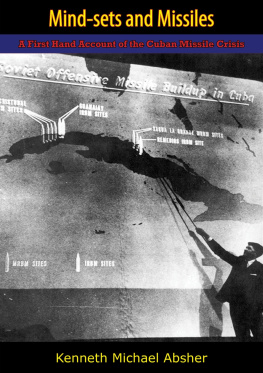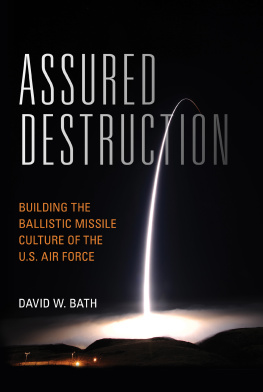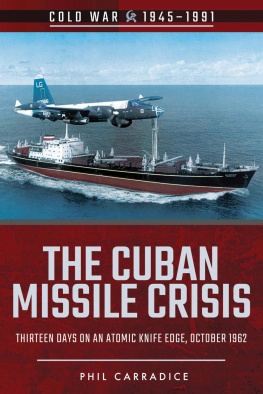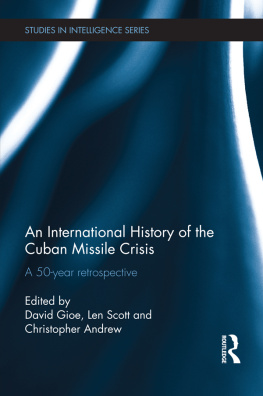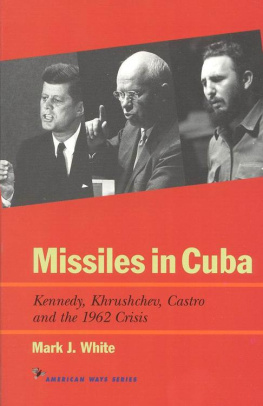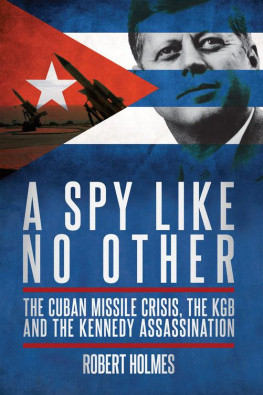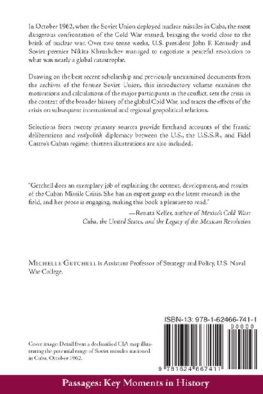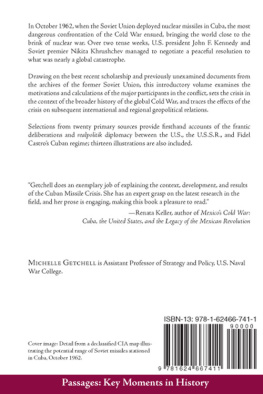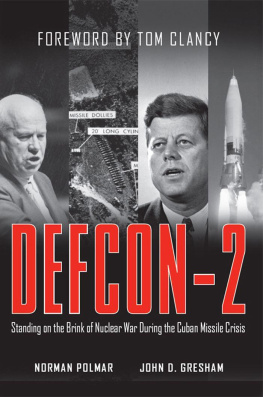This edition is published by Muriwai Books www.pp-publishing.com
To join our mailing list for new titles or for issues with our books muriwaibooks@gmail.com
Or on Facebook
Text originally published in 2009 under the same title.
Muriwai Books 2017, all rights reserved. No part of this publication may be reproduced, stored in a retrieval system or transmitted by any means, electrical, mechanical or otherwise without the written permission of the copyright holder.
Publishers Note
Although in most cases we have retained the Authors original spelling and grammar to authentically reproduce the work of the Author and the original intent of such material, some additional notes and clarifications have been added for the modern readers benefit.
We have also made every effort to include all maps and illustrations of the original edition the limitations of formatting do not allow of including larger maps, we will upload as many of these maps as possible.
MIND-SETS AND MISSILES:
A FIRST HAND ACCOUNT OF THE CUBAN MISSILE CRISIS
BY
KENNETH MICHAEL ABSHER
TABLE OF CONTENTS
Contents
TABLE OF CONTENTS
THE LETORT PAPERS
In the early 18 th century, James Letort, an explorer and fur trader, was instrumental in opening up the Cumberland Valley to settlement. By 1752, there was a garrison on Letort Creek at what is today Carlisle Barracks, Pennsylvania. In those days, Carlisle Barracks lay at the western edge of the American colonies. It was a bastion for the protection of settlers and a departure point for further exploration. Today, as was the case over two centuries ago, Carlisle Barracks, as the home of the U.S. Army War College, is a place of transition and transformation.
In the same spirit of bold curiosity that compelled the men and women who, like Letort, settled the American west, the Strategic Studies Institute (SSI) presents The Letort Papers. This series allows SSI to publish papers, retrospectives, speeches, or essays of interest to the defense academic community which may not correspond with our mainstream policy-oriented publications.
DEDICATION
I am indebted to Ambassador David Abshire, former U.S. Ambassador to NATO, for his encouragement and interest in the importance of identifying and understanding the role of mindsets in the analysis of foreign intelligence and the formation and implementation of foreign policy. As the first Research Fellow with the Scowcroft Institute at the George Bush School of Government and Public Service, I am indebted to Brent Scowcroft for the privilege of serving in his institute. I thank Dr. Jeff Engel, the Director of the Scowcroft Institute, and Dr. Joe Cerami of the Bush School for their encouragement and support. I thank Dr. Sam Kirkpatrick, former President of the University of Texas at San Antonio (UTSA), and Denis Clift, President of the National Defense Intelligence College (NDIC), for the privilege of teaching as an Adjunct Professor at UTSA from 1994 to 1997 and at NDIC from 1997 to 2002. I am also very much indebted to Dr. David Robarge, the Chief Historian at the Central Intelligence Agencys Center for the Study of Intelligence, who is an acknowledged expert on the Cuban Missile Crisis, for his encouragement and his excellent editorial guidance and wisdom. Finally, I am indebted to Dr. Sherman Kent for the privilege of serving in the Office of National Estimates during this historic crisis of the Cold War.
*****
This manuscript is lovingly dedicated to my wife, Cindy, whose constant love and support enabled me to continue researching and writing this paper over a period of many years.
FOREWORD
This Letort Paper provides a detailed chronology and analysis of the intelligence failures and successes of the Cuban Missile Crisis. The author, Mr. Kenneth Absher, contends that, when our national security is at stake, the United States should not hesitate to undertake risky intelligence collection operations, including espionage, to penetrate our adversarys deceptions. At the same time, the United States must also understand that our adversary may not believe the gravity of our policy warnings or may not allow its own agenda to be influenced by U.S. diplomatic pressure.
As both a student of and key participant in the events of the crisis, the author is able to provide in-depth analysis of the failures and successes of the national intelligence community and executive leadership during the build-up to the confrontation, and the risky but successful actions which led to its peaceful settlement. From his analysis, the author suggests considerations relevant to the collection, analysis, and use of intelligence which have continuing application.
SUMMARY
This Letort Paper provides a detailed chronology and analysis of the intelligence failures and successes of the Cuban Missile Crisis, and suggests the applicability of lessons learned to the collection, analysis, and use of intelligence in strategic decisionmaking. The author was assigned to Sherman Kents Office of National Estimates (ONE) after completing his Central Intelligence Agency (CIA) Junior Officer Training Program in June 1962. He was one of two analysts for Latin America in Kents ONE. He was a participant in the drafting of every National Intelligence Estimate (NIE) and Special National Intelligence Estimate (SNIE) on Cuba and the Soviet military build-up from June 1962 to February 1963. This paper describes how the crisis unfolded using the authors personal recollection, declassified documents, and many memoirs written by senior CIA officers and others who were participants. Lessons learned include the need to avoid having our political, analytical and intelligence collection mind-sets prevent us from acquiring and accurately analyzing intelligence about our adversaries true plans and intentions. When our national security is at stake, we should not hesitate to undertake risky intelligence collection operations including espionage, to penetrate our adversarys deceptions. We must also understand that our adversaries may not believe the gravity of our policy warnings or allow their own agendas to be influenced by diplomatic pressure. When Soviet leader Nikita Khrushchev decided secretly to place offensive missiles in Cuba, he clearly did not believe President John Kennedy would use military action to enforce U.S. policy warnings against such a deployment.
Lacking hard intelligence to the contrary, the American Intelligence Community (IC) also issued a failed SNIE on September 19, 1962, stating Khrushchev would not place offensive missiles in Cuba. The Soviets had never before placed such missiles outside the Union of Soviet Socialist Republics (USSR) and the Warsaw Pact and the IC believed that Khrushchev certainly would not run the risk of a U.S. military response to such a provocation. Thanks to the leadership of the Director of Central Intelligence and the President, the United States overcame a political mind-set against scheduling U-2 flights directly over Cuba where they risked being shot down by Soviet surface-to-air missiles. Intelligence from an espionage agent was used by the historic U-2 flight to photograph the SS-4 medium range missiles being installed in western Cuba. An analysis of this and subsequent U-2 photography utilizing the operational manuals of the Soviet offensive missiles provided clandestinely enabled the IC to tell the President how much time he had prior to each missile site becoming operational. Soviet leader Nikita Khrushchev finally agreed to withdraw the missiles, bombers, and nuclear weapons after being convinced that the United States was preparing to launch a massive bombing and invasion of Cuba. The author concluded that such U.S. military operations were within 48-72 hours of being launched when Khrushchev publicly said the missiles would be withdrawn. There was a last minute understanding that Jupiter missiles would probably be withdrawn later from Turkey if Soviet missiles were first withdrawn from Cuba. But imminent U.S. military action was what convinced Khrushchev that the missiles had to be withdrawn.



